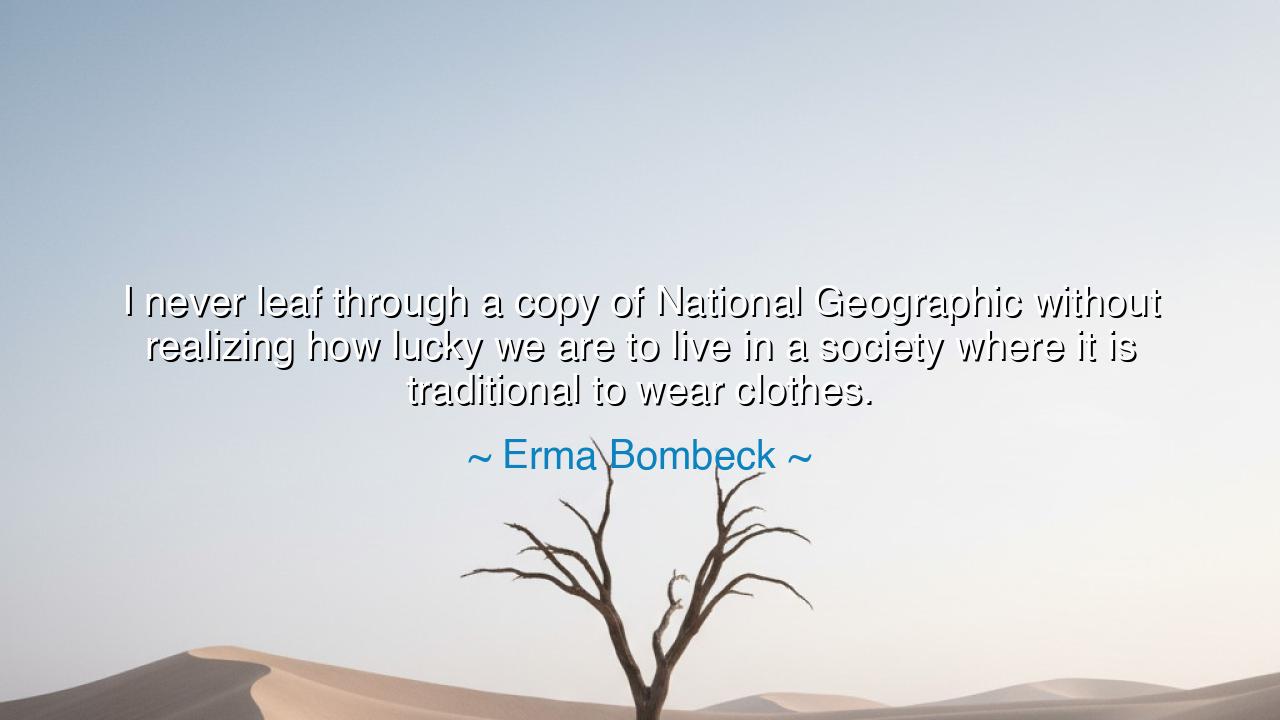
I never leaf through a copy of National Geographic without
I never leaf through a copy of National Geographic without realizing how lucky we are to live in a society where it is traditional to wear clothes.






Hear the words of Erma Bombeck, the great humorist who taught through laughter: “I never leaf through a copy of National Geographic without realizing how lucky we are to live in a society where it is traditional to wear clothes.” At first glance, her words seem light, even playful. Yet beneath their jest lies a profound truth about gratitude, culture, and the way humor can reveal the hidden values of human life. Bombeck, with her wit, reminds us that even the ordinary—the garments we wear daily without thought—is a blessing shaped by tradition, history, and human creativity.
The ancients, too, understood that jest often carries wisdom. The fool in the king’s court could speak truths that no sage dared, and the parables of old wrapped lessons in stories of laughter. So it is with Bombeck. She takes something simple—the act of wearing clothes—and reminds us that it is both a tradition and a shield, a gift of society that guards our dignity, shapes our identity, and binds us together in shared custom. By poking fun, she teaches us to notice what we take for granted.
Her mention of National Geographic is no accident. For that magazine, with its images of far-off lands and peoples, revealed to many readers ways of life vastly different from their own. In those pages, Americans of her time would often see tribal societies where clothing was scarce or ceremonial rather than constant. Bombeck’s humor does not mock those peoples, but instead reflects back on her own society, where daily dress is not only custom but expectation. Her laughter is the laughter of recognition—that what seems natural to one culture is strange to another, and in that contrast we discover gratitude for our own path.
Consider the story of Florence Nightingale, who in the Crimean War demanded cleanliness and proper clothing for the wounded. At the time, many soldiers lay in filth, their garments in tatters. But Nightingale knew that clothes were not mere coverings, but symbols of dignity and healing. By restoring clean dress, she restored morale, and in restoring morale, she saved lives. Here we see that the simple tradition of clothing carries deeper meaning: it marks civilization, respect, and care for the human spirit.
Bombeck’s wisdom also reminds us of a greater truth: that the smallest customs of society are the foundations upon which order and identity stand. Remove them, and much that we call civilization begins to crumble. For garments are not only shields against cold or sun, but also a canvas upon which societies paint their values—modesty, beauty, power, or unity. What seems like a joke is in fact a quiet homage to the invisible bonds that hold us together.
Thus, O child of tomorrow, learn to see humor not as folly but as wisdom in disguise. The jest of Bombeck is a call to gratitude—to look upon even the humblest parts of life, like the clothes upon your back, and see them as blessings. To laugh at life’s peculiarities is not to despise them, but to embrace them with joy and recognition. For laughter, too, is a teacher, and gratitude spoken with a smile still carries the weight of truth.
In practice, cultivate the art of thankfulness in daily things. Look upon the roof above your head, the shoes upon your feet, the shirt upon your shoulders, and know that these are triumphs of human effort and tradition. Remember that not all share them, and let this remembrance move you to generosity and humility. Learn also to laugh at yourself, for in laughter, pride is softened and perspective restored.
So I say unto you: when you see the jest, seek also the truth it hides. Bombeck’s words on clothes are not only humor but heritage; not only laughter but light. Take joy in the ordinary, be grateful for tradition, and remember always that even in laughter lies the wisdom of the ages.






AAdministratorAdministrator
Welcome, honored guests. Please leave a comment, we will respond soon